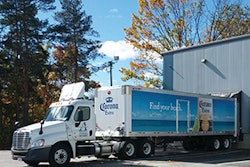Berlin, Germany—Feb. 12, 2014—Since August 2011, Volkswagen, DB Schenker and Continental Teves have been working with researchers from the Fraunhofer Institute for Material Flow and Logistics (IML) and the in-house research unit at 4flow on a project titled InKoRISK (collaborative risk management for integrated planning of production and transportation in the automotive industry). The purpose of the research project is to develop concepts and prototypes for collaborative risk management in order to avoid disruptions in production and transportation, or to handle them efficiently if they do occur.
Global corporations’ supply chains, such as those operated by automotive manufacturers, continue to grow in complexity. Not only natural disasters, such as earthquakes and volcano eruptions, have an impact on global logistics, but also everyday occurrences, such as traffic jams or sudden downtimes in production.
“In order to manage the challenges in global supply chains, it is necessary to engage in collaborative risk management with our supply chain partners,” Wolfgang Michel, head of CTP operations for Continental Teves, said about the research being conducted.
During the first project step, potential risks along supply chains, and methods of avoiding and eliminating risks were identified. After this, a cross-organizational risk management process was defined that supports the assessment of risks and the selection of measures to deal with those risks. Process orientation and cross-organizational collaboration give those involved sufficient time to react in order to mitigate the effects of risks.
The current project phase is now focusing on developing software prototypes that support collaborative risk management on different organizational levels and planning levels. With these decision support systems, potential disruptions can be visualized, and their effects can be analyzed and evaluated. This facilitates a proactive approach to risks during the planning phase, as well as making decisions on how to respond in case operations are disrupted. The functionality and benefits of the decision support systems are being tested and assessed using realistic case studies in cooperation with industry partners.












